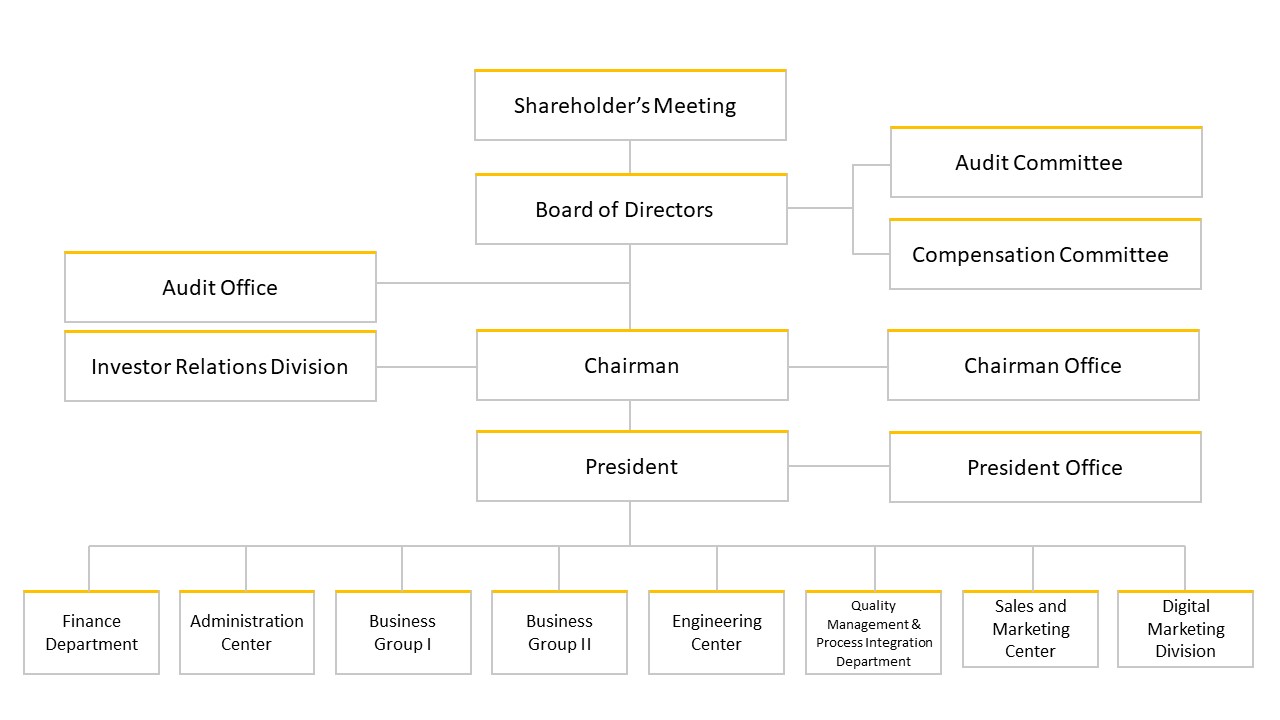
Corporate Governance
Organization Chart

Board of Directors
Members of the Board
The "Corporate Governance Practice Principles" of eMemory sets the composition of the Board of Directors to consider diversification, and formulates appropriate diversification policies based on the company’s operation, operation type and development needs, including but not limited to two major aspects: basic conditions and values (such as gender, age, nationality and culture, etc.) and professional knowledge and skills (such as law, accounting, industry, finance, marketing or technology). The Board of Directors must also have the knowledge, skills and literacy necessary to perform their duties. Currently, the 10 members of the Board have professional backgrounds in industry, academia and medicine, and each have expertise in management, leadership decision-making, industrial knowledge, academy, and finance. The proportion of Directors with employee status is 30%, and Independent Directors accounted for 30%. In addition, eMemory also emphasize gender distribution in the composition of Directors. The goal of female directors is at least one seat. Currently, we have one female Directors, accounting for 10%.
| Title | Name | Major Experience | Professional Skills |
|---|---|---|---|
| Chairman | Charles Hsu |
|
|
| Independent Director | T.C. Chen |
|
|
| Independent Director | Jack Sun |
|
|
| Independent Director | Danny Perng |
|
|
| Director | F.C. Tseng |
|
|
| Director | Li-Jeng Chen |
|
|
| Director | Michael Ho |
|
|
| Director | Mu-Chuan Hsu |
|
|
| Director | How-Han Investment Corporation Representative: Chris Lu |
|
|
| Director | How-Han Investment Corporation Representative: Felix Hsu |
|
|
Audit Committee
The main purpose of Audit Committee is assisting the Board of Directors in performing the supervision on the quality and faith of execution regarding accounting, audit, financial report process and financial control of eMemory. The Audit Committee consists of three Independent Directors, one as the Convener. A total of 5 Audit Committee meetings were held in 2023 with the 100% attendance rate of the committee members.
Remuneration Committee
The Remuneration Committee of eMemory takes charge of assisting the Board of Directors in executing and assessing the entire remuneration and welfare policies of the company, and the remuneration of Directors and managers. The committee members are appointed by the Board, composed by at least one Independent Director. A total of 2 Remuneration Committee meetings were held in 2023 with the 100% attendance rate of the committee members.
Committee Members
| Name | Audit Committee | Remuneration Committee |
|---|---|---|
| Mr. T.C. Chen | ||
| Mr. Danny Perng | ||
| Mr. Jack Sun |
Communication between Independent Directors, Internal Audit Supervisors and Accountants
eMemory was re-elected at the shareholders meeting on June 9, 2015, and set up an Audit Committee to replace the supervisory authority. The Audit Committee is composed of all Independent Directors. eMemory’s Audit Supervisors regularly submit audit reports to Independent Directors for review. Independent Directors can then ask the Audit Supervisor to further explain the content of the report. In addition, the company’s Audit Supervisors must have full attendance at each Audit Committee meetings and Board of Directors meetings, and will report the internal control quarterly. This ensures the effectiveness and the tracking of the improvement items can be fully communicated face-to-face with the Audit Committee. When the Audit Committee reviews the quarterly financial statements, the company’s accountants will attend all the Audit Committee meetings and report on the reviewed items to ensure effective communication between the audit committee and the accountants.
Internal Audit
The purposes of internal audit are to assist the Board of Directors and managers in reviewing the effectiveness of the Company’s internal controls, operational effectiveness, and efficiency, and then to provide recommendations. This guarantees the continuous functioning of the internal control system and generates recommendations as to how to improve said system.
The internal auditor reviews the company’s internal tasks and monitors its subsidiaries in accordance with annual plans, which need to be approved by the Board of Directors. Besides informing the Board of Directors during its ordinary meetings, it briefs the Board Audit Committee on a quarterly.
Internal auditing includes investigation and evaluation of internal control standards, as well as assessment of existing policies and procedures, and their effects on operational activities.
Internal auditor is an independent and under the board of directors. Any appointment or discharge of the chief internal audit shall be approved by the Board of Directors after being reviewed by the audit committee. When there is a change in the chief internal auditor, the company shall report the change and the reasons for it within 2 days from the date of occurrence via the Internet-based information system to the FSC for recordation.
